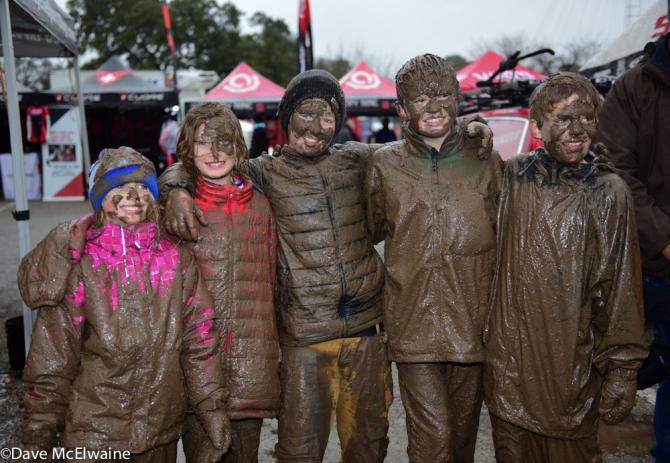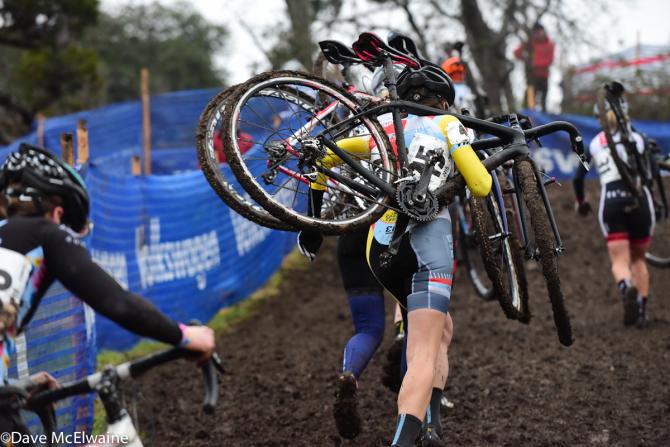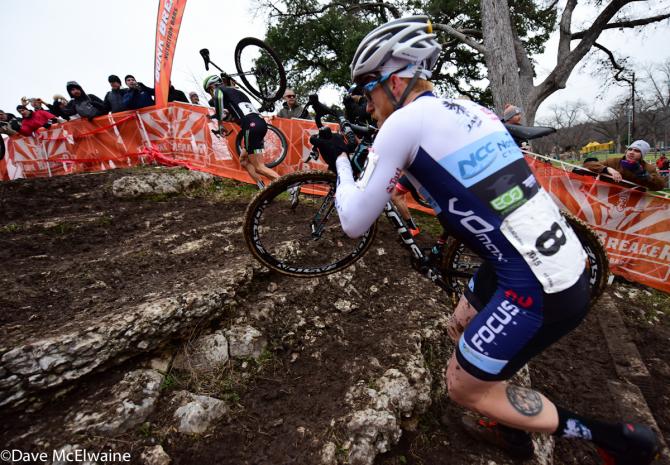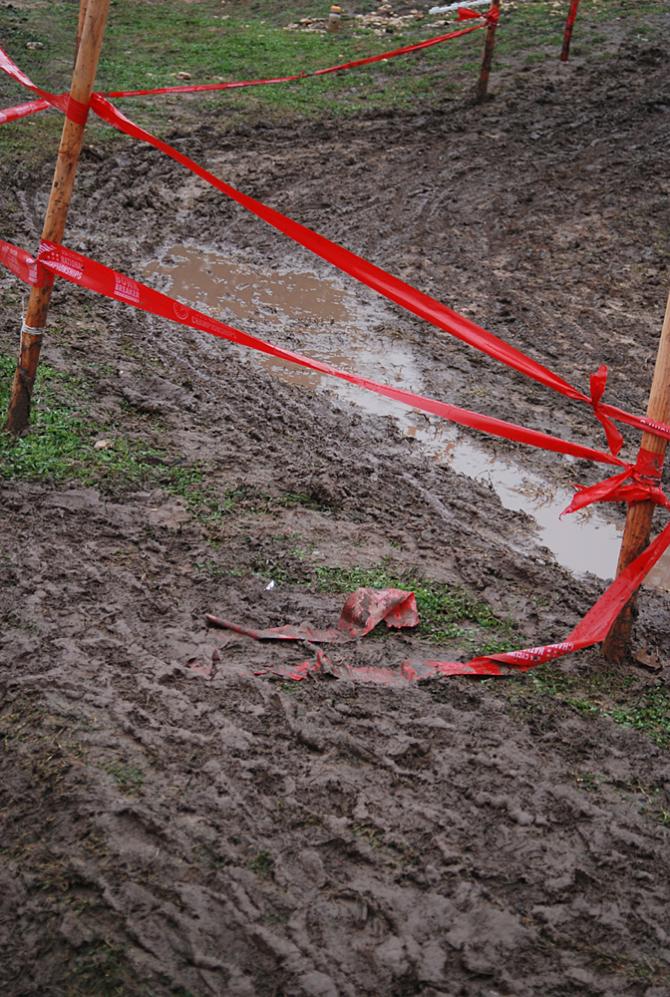USA Cycling responds to mud-slinging over 'cross national debacle
Refunds for riders who could not race the postponed event




USA Cycling has responded today to a storm of criticism it has faced in the days since it postponed its Cyclo-cross National Championship events, promising to refund registration fees to riders who were not able to race on Monday, and justifying the decision to combine the junior fields in the condensed schedule.
The week of racing in Austin's Zilker Park was running smoothly for four straight days, despite what some might call perfect cyclo-cross conditions: cold weather, rain and mud. That all changed on the morning of Sunday's scheduled elite races. Riders arriving to the course found the entrance blocked by police cars and were told the race was cancelled. Others came under threat of being charged with trespassing if they did not leave the venue immediately.
It was an unprecedented fiasco, and while USA Cycling was able to hastily negotiate the rescheduling of races until the next day, it was little consolation to the 81 riders who were not able to stay and for those who raced but incurred additional costs to reschedule flights and stay another night in a hotel.
USA Cycling's Vice President of National Events, Micah Rice, in a letter to members, explained what happened and apologized to the riders for a situation that arose entirely outside of his organisation's control.
"Regardless of whether or not you were able to stay or you had to get back to work or school — or if arrangements were too expensive to justify — we are truly sorry that this happened," Rice said, addressing the racers.
Rice said USA Cycling was taken by surprise by the city's sudden decision to stop the race. It became clear by Sunday afternoon that a group called the Austin Heritage Tree Foundation had asserted political pressure on the Austin City Parks and Recreation department (PARD), stating that the race was violating city ordinances designed to protect the park's hundred-year-old trees and was causing irreparable harm.
The group found a sympathetic ear, reportedly an assistant director, who called in the police to shut down the park. The problem was, according to Rice, nobody bothered to let USA Cycling know the race was cancelled or give them a chance to negotiate a solution until close to the scheduled start time on Sunday.
Get The Leadout Newsletter
The latest race content, interviews, features, reviews and expert buying guides, direct to your inbox!
"We were blindsided by an organization whose goal was to cancel our event, and PARD sided with them in a last-minute decision when it was too late for us to do anything," Rice told Cyclingnews.
Political pressure behind race delays
The Austin City Parks and Recreation department has not officially acknowledged the reason behind the cancellation. In a hastily assembled press conference on Sunday, Austin City Parks and Recreation Director Sara Hensley never apologized for the action, or explained why the organisers were not given a chance to re-route the course on the morning of Sunday's regularly scheduled race. She only noted that some residents had complained and expressed concern that the race was causing irreparable damage to the park.
"There is no win here, I can say that with all sincerity," Hensley said.
Although Hensley blamed the city's actions on the "one and a half to two inches of rain" that fell, the national weather service measured less than half an inch of rain for the week, the bulk of it falling on Saturday. During a walk-through by the city on Saturday evening, no issues were noted.
"I can assure you that from the moment we first received reports of police turning competitors and fans away, we began calling and emailing Parks officials," Rice wrote. "When we did finally reach someone, the department was adamant about closing the park for 48 hours to allow crews to lay mulch over exposed root areas and re-assess the course. Obviously such a position was an impossibility in our eyes because we were adamant that racing had to happen."
It took some cycling-friendly political pressure, including a call from Lance Armstrong to Hensley's office, just to get the city to sit down at the table with USA Cycling. By the time that happened, a solution to the Heritage Tree Foundation's objections was agreed upon, but the process took most of Sunday.
"As you know, the course changed very little in the reroute for Monday (the Heritage group was part of that walk through)," Rice told Cyclingnews. "These changes could have been made any time prior to Sunday morning and we would have happily made them if we had been requested to do so. PARD was quite informed about how muddy the course could get if it rained."
Austin won a bid to host the national championships without having hosted a UCI-sanctioned race or a test event, and while Rice stood by USA Cycling's decision to award the championships to the city without a test event, he admits that this incident will make the organisation reconsider its process in the future.
"I think this mess would change anyone’s thought process on how they look at a cyclo-cross venue from now on — not just our event but other race directors," Rice said. "I think there will be extra precaution taken on making sure that venues and landowners understand the impact of cyclo-cross, but I still stand by my statement that there is little I could have done to avoid this particular situation."
With the city insisting that racing be held after noon on Monday, and the sun setting at 5:50PM, there was not enough time to hold all of the junior and elite fields separately. USA Cycling had time for five fields, and Dot Abbott, the chief commissaire, made the choice to put the 15-16 boys solo, the largest field at 84 registrants, then put the smaller junior women 15-16 and 17-18, and UCI junior men 17-18 fields on the course at the same time.
The result was that some of the junior women raced only one lap, and those who did race were not clear about whether they were racing for the medals because of the confusion. Rice defended Abbott's decision to combine the races, saying the main goal was to ensure an unimpeded podium for the top riders.
"The riders in contention for the medals would have fewer slower riders on course that they had to pass — had the women’s 15-16 riders been forced to start behind the men’s 15-16, the front of the women’s race would have been riding through much more traffic on lap one."
Part of the problem was that the course modifications made to appease the tree advocates meant there was no option to shorten the course for the juniors to make their lap times short enough to meet the schedule.
The explanation may not be easy for a rider who raced a single lap of the national championship to understand, and Abbott faced harsh criticism and accusations of sexism on social media.
Rice said the situation was not ideal, "especially considering that our goal from the beginning was to showcase this women’s group on the final day of Cyclo-cross Nationals along with the elite riders. This was an unfortunate and unavoidable byproduct of a delayed and condensed schedule", he said.

Laura Weislo has been with Cyclingnews since 2006 after making a switch from a career in science. As Managing Editor, she coordinates coverage for North American events and global news. As former elite-level road racer who dabbled in cyclo-cross and track, Laura has a passion for all three disciplines. When not working she likes to go camping and explore lesser traveled roads, paths and gravel tracks. Laura specialises in covering doping, anti-doping, UCI governance and performing data analysis.